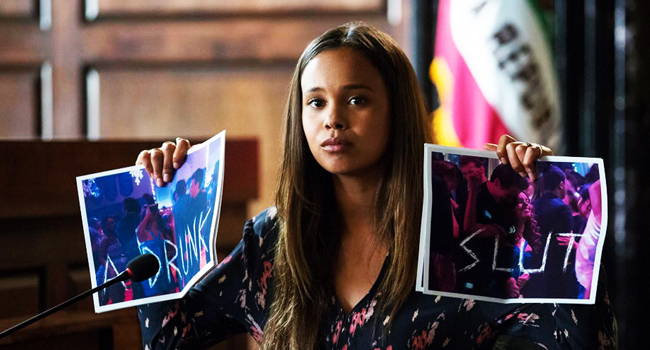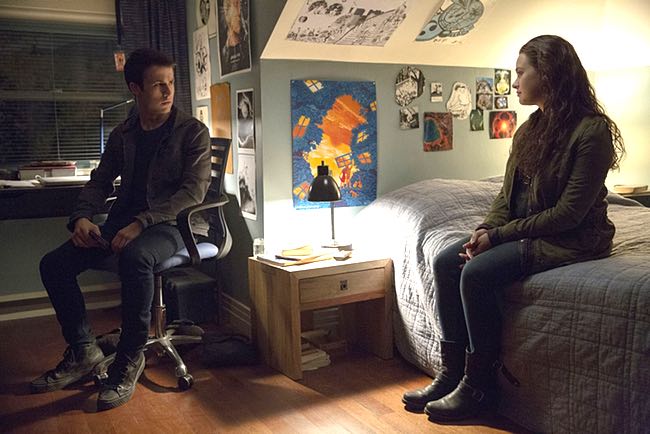
“One picture never tells the whole story,” one character insists early in 13 Reasons Why season two, which debuts Friday on Netflix.
“You heard my story the way I wanted it to be told,” Hannah Baker (Kathrine Langford) explains later, “but there’s always another side to every story.”
Variations on these sentiments are expressed over and over again throughout the early episodes of the drama’s new season, as if creator Bryan Yorkey and everyone else involved feels pressured to explain the series’ continued existence.
They should. The first season had its flaws — not enough story to fill 13 hours (a problem most Netflix dramas share, but more pronounced here), a penchant for ominous melodramatic warnings with no real payoff, and a graphic scene depicting Hannah’s suicide that many viewers felt glamorized the act — but its best moments approached the thoughtfulness and emotional power of classic dramas about teens like My So-Called Life and Friday Night Lights. But the season was also telling a very specific, finite story: the many emotionally cruel moments that drove Hannah to take her life, and the impact of her leaving behind a series of audio cassettes telling her sad tale to the people she holds responsible. The first season “solves” the mystery of why Hannah did it (as much as a thing like that can be), and why each member of the Baker’s dozen received the tapes, and it even ends with her friend Clay Jensen (Dylan Minnette) giving the tapes to her parents as they prepare to sue the school district for indulging the toxic atmosphere that destroyed their daughter. By the end, it had largely used up the plot of the best-selling YA novel by Jay Asher that inspired it, and there was no real reason to keep going.
Well, there was one reason: the show was a word-of-mouth phenomenon for Netflix (as far as we know, given the secrecy about how many people are watching any of their content), and an algorithm-driven company isn’t going to give up on a successful product just because it creatively makes no sense.
So Yorkey and his collaborators pick up five months after Hannah’s death, as Olivia Baker (Kate Walsh) is about to put the school on trial, Clay is immersing himself in a new relationship to try to stifle his grief, and two new conspiracies are afoot: one to encourage Clay and his friends to keep digging into the many crimes of king jock Bryce (Justin Prentice), the other to intimidate trial witnesses from naming Bryce (who raped Hannah shortly before her death) or his friends. (After audio cassettes last time, this year’s analog technology is Polaroid photos; I look forward to season five, where Clay finds more clues about what really caused Hannah’s death written inside a book of Mad Libs.)
The repeated idea that people may not have been looking at Hannah’s story properly is there to justify these new episodes, but those lines inadvertently sum up the other big flaw of from the start of the new season beyond its mere existence, by suggesting that the people making the show were most interested in the parts of season one that worked least, and vice versa.
Or, at least, Yorkey and company may have decided that the weakest parts — the mysteries (and, by extension, all the characters like Christian Navarro’s Tony who speak and act cryptically for the sole purpose of keeping those mysteries going), the jock bullies operating like a junior Mafia — were the easiest way to keep the story going. With each new revelation, each new flashback that adds additional context to one of last season’s flashbacks, it begins to feel less like a sensitive teen drama than like one of those forgettable Lost rip-offs that thought the key to success was introducing five new questions for every old one that gets answered.

It’s really disheartening (and led me to tap out after only four of the 13 episodes), despite continued strong work from so many members of the ensemble. But even that feels tainted by the hoops season two jumps through to keep Katherine Langford prominent throughout. Langford was the deserved breakout star of the first season, achingly tying the many different Hannah Bakers that her classmates saw to the one that only she truly knew, and season one was so flashback-heavy that it was easy to feature her a lot. Season two? Well, it features some flashbacks, albeit not as many, and for the rest of her screentime… well, Yorkey opts for a device that frequently plays as funny when it’s not meant to, and that causes severe tonal whiplash on the rare occasions when the laughs are intentional.
On the eve of the trial, Mrs. Baker tells her lawyer Dennis (Wilson Cruz) that she rejected the school’s settlement offer because it included a non-disclosure agreement.
“Hannah’s story needs to be told,” she says.
But Hannah’s story was told last season — imperfectly at times, stunningly at others. And each additional reason, each additional season, dilutes the impact of when we first heard it.
Alan Sepinwall may be reached at sepinwall@uproxx.com. He discusses television weekly on the TV Avalanche podcast. His new book, Breaking Bad 101, is on sale now.
